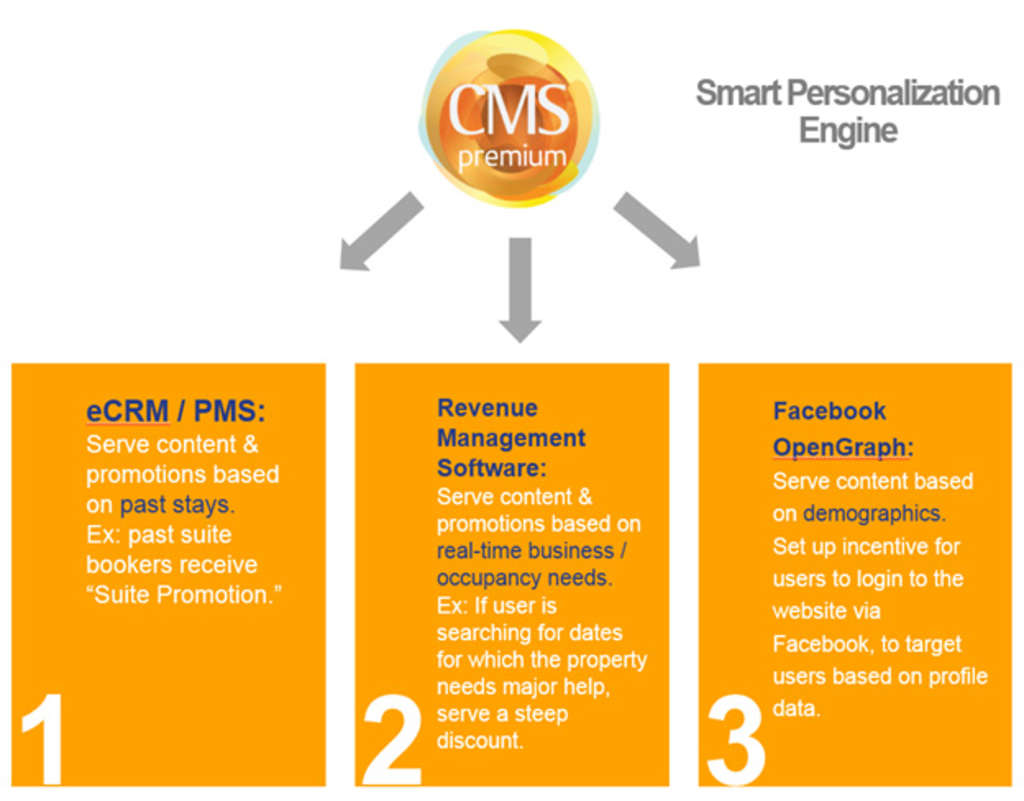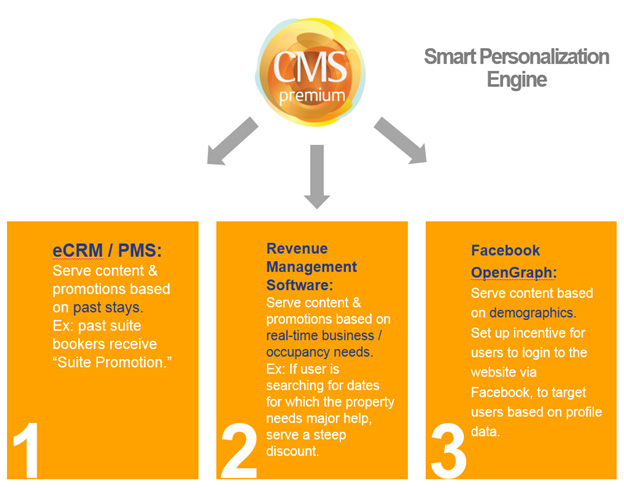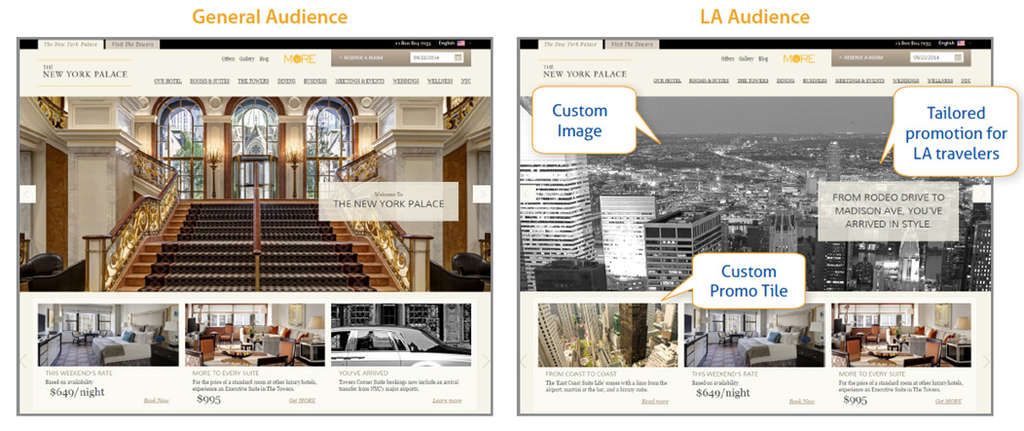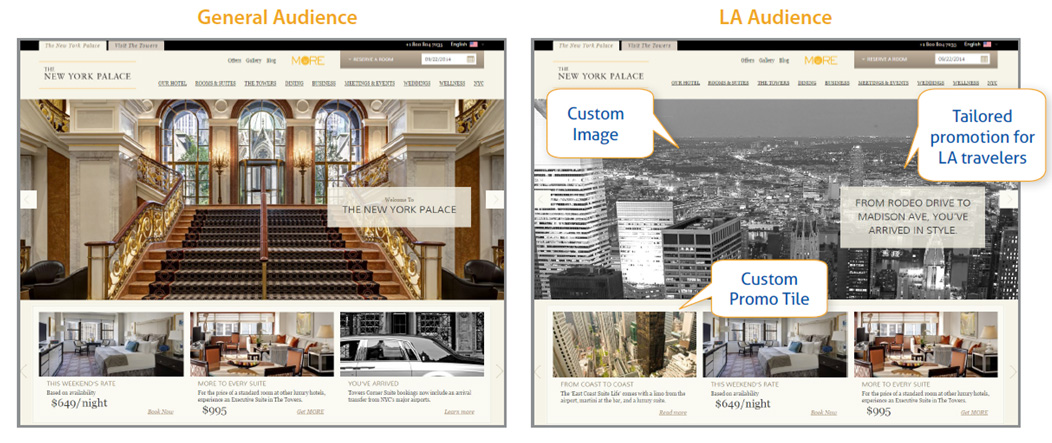How Dynamic Content Personalization Maximizes Website Revenues and Increases Customer Loyalty
Traditionally, hotel websites have served the same content to all site visitors regardless of their preferences, demographics, and even geographic location. Every website visitor is served the exact same textual and visual content as well as promotional content in the form of special offers, packages, opening slides, marketing messages, promo tiles, and more.
Some bigger hotel brand websites provide language, content and pricing personalization based on the user's affiliation with a loyalty program or IP address to better differentiate their offering in certain markets (e.g. domestic vs. foreign; U.S. vs. UK, etc.).
Static Website Content – One Size Fits All?
Hoteliers need to customize the content on their websites to fit the interests and preferences of different demographic and geographic audiences. The more relevant (read custom, dynamic) content you deliver to your website visitor, the higher the level of engagement, conversions and revenues. Hotels have the 'home field' advantage: they know who is coming to their hotel website, and they should be personalizing the content according to this data.
Here's an example of how a full-service resort in Florida should be dynamically personalizing content, based on the type of website visitor:
- Family travel planner: visual and textual content should be all about family fun; promotional content should focus on family packages, specials and family-friendly accommodations and activities.
- Corporate meeting/retreat planner: content on the site should "scream" meeting-friendly resort with customized imagery depicting corporate retreats, conference facilities and team-building events. Textual content should describe the resort as the ideal meeting destination, emphasizing meeting facilities and amenities. Promotional content should focus on complete meeting packages, hot dates, and other corporate group promotions.
Same website, completely different, personalized experience.
Multiple E-commerce research companies have found that the more relevant a website's content is to the user, the more it resonates with user preferences and purchasing behavior, translating into higher conversions on the website. Companies that are personalizing content, promotions and user experiences on their websites are reporting uplifts in E-commerce sales as high as forty percent!
Dynamic Content Personalization to the Rescue
Dynamic Content Personalization involves the development of a Website Content Personalization Strategy that entails delivering unique and relevant textual, visual and promotional content to site visitors based on their demographics, geo location, website pathing behavior, past booking history, guest preferences, reward program affiliation or affiliation to a particular customer segment (transient corporate travel, leisure travel, family travel planner, corporate meeting planner, SMERF group planner, wedding planner, social event planner, etc.).
This strategy takes on various tactics, starting with serving the most relevant content to website visitors based on their geo-location, affiliation to affinity groups and customer segments, and loyalty program members.
How Dynamic Content Personalization Can Help Hoteliers Shift Share from the OTAs
OTAs have been bragging about their Big Data -
gigantic amounts of data about their website users and user browsing and purchasing behavior. At the same time the OTAs have relatively "small data" about hotel guest on-property behavior, such as stay preferences, dining and activity purchasing habits while on property. This is a huge advantage hoteliers have yet to effectively exploit. Dynamic Content Personalization is definitely one of the smart tools hoteliers must employ to shift market share away from the OTAs.
When shopping around for a new website redesign, a dynamic content personalization-enabled CMS (Content Management System) that enables the property to offer personalized user experiences on the hotel website must be a top priority. This strategy of delivering content that is unique and relevant to site visitors is not only pioneering but will give the hotel a competitive edge in this very competitive marketplace.
Industry First: The Smart Personalization Engine
HeBS Digital's award-winning CMS Premium (Content Management System) technology has been designed with full content personalization capabilities and features an industry-first Smart Personalization Engine application.
The Smart Personalization Engine provides hoteliers with an innovative and extremely powerful tool that enables them to target property website visitors with personalized textual, visual and promotional content, boost conversions and maximize website revenue.
The Smart Personalization Engine allows the property website to target:
- Visitors from specific feeder markets (geo-targeting):
- Domestic: In-state, neighboring states, main feeder market states, metropolitan areas and cities
- Foreign feeder markets: Countries or metropolitan areas and cities
- Return site visitors vs. first-time visitors
- Customer segment affiliations:
- Business vs. leisure travelers
- Corporate group planners
- Social event planners
- SMERF group planners
- Loyalty Program members vs. non-members (convert non-member to members)
- Loyalty members as a whole or different membership levels (Platinum, Gold, Silver, etc)
- Browser-specific personalization
- Search query specific personalization
- Referrer-specific personalization
- Past booker personalization:
- Second time bookers
- People who booked more than 3 months ago
- Offering suite promotion to past suite bookers
- Etc.
- Demographics based on Facebook's OpenGraph integration on the hotel website
Hotelier's Action Plan to Implement Dynamic Content Personalization:
Since there are so many options and opportunities to target website users based on geo-targeting, customer segment affiliation, language preference, user behavior, or loyalty program affiliation, hoteliers are justifiably confused as to how and where to start with content personalization.
For years now, HeBS Digital's hotel clients have been enjoying the benefits of dynamic content personalization and have achieved higher user engagement and conversions on the hotel website. We have developed a robust action plan that has been proven to maximize revenues and boost conversions on the property website.
Action Step I:
Business Analysis and CMS Technology Upgrade
The first step for any hotelier is to "dissect" its customer base and come up with a business analysis as to which website visitors a) would benefit most from personalized, relevant content delivery and b) are most likely to book an offer personalized to their preferences or situation. This may include identifying the most important domestic and foreign feeder markets; customer segment affiliations (leisure and business travelers), etc.
Simultaneously, hoteliers must upgrade their websites with a dynamic content personalization-enabled CMS technology. New, sophisticated content management system (CMS) technology such as HeBS Digital's CMS Premium is available today to any hotel – small or large.
Action Step 2:
Go after the Low Hanging Fruit
Targeting the property's key feeder markets is of utmost importance to any hotel marketer. Travelers residing in different feeder markets exhibit different travel planning and purchasing behavior.
For example, at a Florida resort, the summer months are dominated by drive-in guests from in-state or neighboring states as well as foreign vacationers. Winter months are dominated by fly-in guests from the Northeast, Latin America and Canada. Dynamic content personalization based on geo-targeting is the logical first step for this resort, and will benefit the property in the form of higher conversions and incremental revenues.
What type of personalized content works best?
Over the years, we have found that personalized visual and promotional content works best for geo-targeting.
Examples include:
- Custom-designed opening promo slide in the website's main image window served to a specific user group based on their location/IP address. Example: opening slide promoting a 'Florida State Resident Special' to users who reside in Florida.
- Customized marketing message in the main image window
- Customized Featured Special promo tiles on the Home Page
Content creation could be a very involved and expensive process: From new photography and designing a new page layout (Ex. corporate vs. leisure travel Home page design), to copywriting and landing page creation, etc. Therefore we suggest "keeping it simple" in the initial phase and launching the geo-targeting campaign with personalized opening promo slides, marketing messages and promo tiles.
Whom to target?
Domestic feeder markets:
- In-state residents: Offer them a "State Resident" special. For example, for many years Florida hotels have been offering a "Florida Resident Special," typically 10% below BAR.
- Main drive-in out-of-state feeder markets: Offer an "Out-of-State Courtesy Special," with free parking or fuel credit if they stay more than a single night.
- Main fly-in feeder markets: Offer free breakfast, advance purchase rates, third night at 50% off, weekend extensions at a reduced rate, etc.Example of Dynamic Content Personalization campaign for a New York City-based hotel, targeting visitors from Los Angeles:
Foreign feeder markets:
- Offer special long-stay promotions: "Stay 5 nights, Get the 6th night free," suite packages or upgrades to suites, etc.
- Serve foreign language content (if available on the website) based on the default language preference in the user's browser.
Action Step 3:
Expand the Target Audiences and Personalization Techniques
Once geo-targeting is in place, expand the dynamic content personalization to new audiences while utilizing more elaborate content personalization techniques and approaches, such as: customized design versions of the property Home page; personalized content pages; specialized landing or promotional pages; foreign language versions or summaries of the website, etc.
Here are just a few examples of personalization techniques targeting various important audiences:
Reward Program Members
If you have a loyalty program in place, start targeting loyalty program members with member-only:
- Customized design theme of the Home Page
- Opening slides and visuals
- Customized content and landing pages
- Promotions, packages and special offers
- Upgrade offers (i.e. suite upgrade)
- Dining, spa, golf, etc. promotions
What about users who are not members of the loyalty program? Target them with "Become a Loyalty Member" textual, visual and promotional content, featuring the benefits of the property's loyalty program. Consider offering a sign-up bonus in the form of a 10% discount off their first booking.
Utilizing the powerful tool of content personalization, perhaps now is the time for a property without a loyalty program in place to create a simple "Guest Appreciation Program" offering rewards to repeat customers. Examples: Free Wi-Fi or breakfast with your second stay; free suite upgrade with 5 roomnights or a free night with 10 roomnights.
Return Visitors vs. New Visitors to the Hotel Website
Serving personalized content to return visitors vs. new visitors to the hotel website is a logical expansion of the property's dynamic content personalization strategy.
For example, for a multi-property luxury hotel client, we tag every visitor to their brand website to determine first-time visitors, return visitors, last-time visit sessions, visit duration, and on-site pathing behavior. This allows us to target new and return visitors to the website with personalized textual, visual and promotional content.
Return Visitors:
- We mark any return visitor as "Returning Visitor" and serve up:
- Personalized opening slide in the main image window with "Welcome Back" messaging when they come back to the website.
- Special promotion for return visitors (if such promotion available).
- Personalized visuals on the site aimed to broaden the knowledge about the property's services and amenities.
- We update tagging information if the user visits a specific property page, to know which property the user last visited. This gives us the ability to display more personalized "Welcome Back" messages, directly related to a property. We can also pre-select this hotel in the booking widget the next time they visit the website.
- When the user initiates a booking and clicks on the "Check Availability" button, we also store: Selected property, check-in and check-out dates, promo code/special offers code selected, etc. This allows us to dynamically adjust the reservation widget with this information when the user comes back to the website, as well as serve relevant promotions applicable for the selected dates.
New Visitors:
- Serve a personalized opening promo slide on the website with customized marketing messages.
- "Bribe" new visitors to the website with a specialized 10% off promotion, since acquiring new visitors is more difficult and expensive than retaining existing visitors.
Business vs. Leisure Travelers
Another targeting opportunity is serving differentiated content to business vs. leisure travelers. This type of content personalization on the website helps address a gap in the business traveler's needs and position the property as more business traveler-friendly in the eyes of your corporate guests. At the same time, this approach allows you to present your property as a leisure travel-friendly hotel in front of your weekend, family and senior travel audiences.
In the case of a primarily leisure hotel trying to expand its corporate clientele, here are just a few examples of user-specific content that can be served dynamically on the site:
- Different, more business-like look and feel or color schema of the Home Page or the whole website.
- Different photo rotation on the Home Page e.g. photos with corporate travel theme vs. leisure travel theme (remaining visitors on the site will see the regular photos).
- Promotional opening slide with a concrete promotion targeting business travelers (e.g. Free Wi-Fi; Free Parking; Extend your stay over the weekend at 50% off, etc.).
- Opening paragraph on the home page customized for business travelers.
- Business travel special offers in the Featured Special promo tiles on the website.
- Reservation Widget: dates defaulted to a typical business travel booking window and day of arrival.
- Booking engine results (after dates selected) featuring business class accommodations such as executive rooms and suites as well as any business travel specials and promotions.
- Reservation abandonment and recovery programs featuring business traveler-related messaging and promotions.
Naturally, reverse content personalization will apply to targeting leisure travelers, weekenders, family travelers and seniors for any business hotel aiming to increase its share of the leisure market.
Real-Time One-to-One Marketing and Pricing is the Next Logical Step
Interfacing the website CMS's Personalization Engine (such as HeBS Digital's Smart Personalization Engine) with the property eCRM platform, PMS or RMS (Revenue Management System) opens up huge opportunities for next-gen personalized pricing and one-to-one-marketing. The property could then personalize content for:
Past Bookers vs. Lookers:
Based on the booking history of the website user, the property can serve customized promotions and pricing to each of the two categories. For example, the property may want to "bribe" a 'Looker' with a first-time booking discount or offer an upgrade to a 'Past Booker.'
Room Bookers vs. Suite Bookers:
No property would like to see their precious suite guests "downsize" to mere room accommodations. Based on the booking history, the property can now offer suite promotions to 'Suite Bookers,' and offer 'Room Bookers' promotions for room accommodations as well as promotions for suite upgrades.
One-to-One Pricing Based on Real-Time Occupancy Needs:
Interfacing the CMS's Personalization Engine with the property's RMS (Revenue Management System) allows real-time targeting and one-to-one pricing based on real-time occupancy needs. In this scenario, the sky is the limit for true dynamic pricing opportunities and upsells. For example:
- A user is searching for dates for which the property needs major help, and the website serves a steep discount visible only to this particular user.
- A user is searching to stay during compressed dates, and the property pushes a suite rate or a suite upgrade to alleviate the constricted supply.
- Business travelers and flexible leisure travelers are offered suite upgrades and weekend extensions as well as alternative dates.
Conclusion:
This article is not describing futuristic dynamic content personalization opportunities. This technology exists and is already generating serious revenues for a number of our hospitality customers, including regional hotel chains, luxury independent hotels, family resorts, casinos, and more.
Choose your next website design and development vendor wisely. Ask tough questions about their CMS technology, and make sure they equip the new property website with a Content Management System with personalization engine capabilities. Avoid vendors offering off-the-shelf and open source CMS technology, since these generic solutions are simply not capable of offering dynamic content personalization and one-to-one marketing.
Dynamic Content Personalization allows hoteliers to leverage their "big data" about past guests' on-property behavior, stay preferences, dining and activity purchasing habits while on property. This is one of the smart tools hoteliers must employ to better engage customers, gain advantage over the competition, and shift market share away from the OTAs.
About the Author and HeBS Digital
Max Starkov is President and CEO of HeBS Digital, the hospitality industry's leading digital technology + website design, full-service digital marketing and website revenue optimization consulting firm, based in New York City (www.HeBSdigital.com).
HeBS Digital has pioneered many of the best practices in hospitality digital technology and full-service digital marketing, social and mobile marketing, and direct online channel distribution. The firm has won over 250 prestigious industry awards for its digital marketing and website design services, including numerous Adrian Awards, Davey Awards, W3 Awards, WebAwards, Magellan Awards, Summit International Awards, Interactive Media Awards, IAC Awards, etc.
A diverse client portfolio of top-tier major hotel brands, luxury and boutique hotel brands, resorts and casinos, hotel management companies, franchisees and independents, and CVBs are benefiting from HeBS Digital's direct online channel strategy and digital marketing expertise. Contact HeBS Digital's consultants at (212) 752-8186 or[email protected].
ABOUT NEXTGUEST
NextGuest provides hoteliers with everything they need to thrive in the digital world, with bespoke technology solutions developed to meet the needs of luxury hotel clients coupled with elegant design capabilities that bring brands to life. We marry the power of data with brand discovery to uncover unique strategies that apply to everything from website design, content marketing, CRM, and more, helping the world's top hotel brands maximize ROI as they acquire, convert, and retain guests throughout the travel planning journey. While each of our services is available on its own, the integrated technologies, marketing, and consulting offerings work together to increase digital engagement and generate revenue for hoteliers, allowing them to focus on what matters most — serving their guests. www.nextguest.com | [email protected]
Mariana Safer
SVP Global Marketing
NextGuest merged with Cendyn



